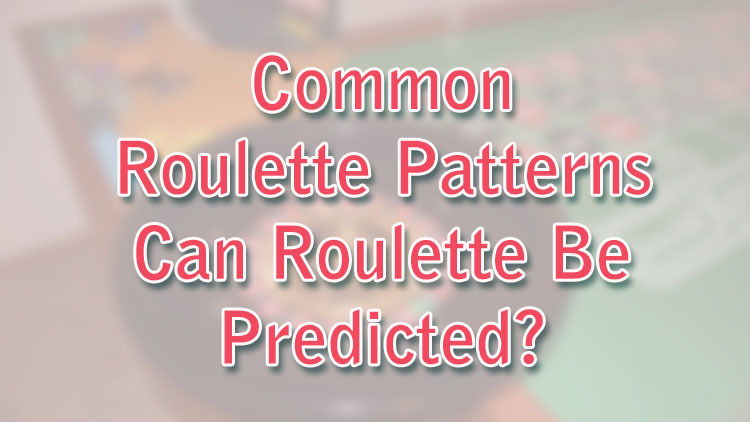
Roulette, the centuries-old casino favourite, has been a source of intrigue for players worldwide. The game's unpredictability and the novelty of the spinning wheel have led to enduring fascination. One question that often arises among players is whether there are any discernible patterns in roulette outcomes, and if so, can these patterns be used to predict future results?
Is There A Pattern To Roulette?
The simple answer is no. There isn't a discernible pattern to roulette. As a game of chance, the outcomes of each spin in roulette are independent and random, making it impossible to predict the result of the next spin with any certainty. This randomness applies to both traditional, physical roulette games and their online counterparts.
Online roulette games utilise Random Number Generators (RNGs) to ensure that the outcomes of each spin are entirely arbitrary and independent of previous results. The RNG uses complex algorithms to generate a sequence of numbers that is completely random and has no discernible pattern. Each sequence corresponds to a random outcome on the wheel.
In physical casinos, roulette outcomes are influenced by various uncontrollable factors. These include the speed of the wheel and the ball, imperfections on the wheel, air pressure, and humidity, among other things. These variables make it impossible to predict the outcome of any given spin.
Is It Mathematically Possible To Beat Roulette?
The prospect of beating roulette using mathematical strategies is undoubtedly appealing. However, the reality is that roulette, being a game of chance, cannot be defeated using mathematical calculations or systems.
Physical roulette games have too many uncontrollable variables that no amount of calculations can account for. On the other hand, online roulette uses an RNG that meets high standards of randomness, ensuring that predicting outcomes using mathematical formulas is improbable.
However, this doesn't prevent players from using various betting strategies, such as the Martingale, the D'Alembert or the Fibonacci system. While these strategies may offer a structure to their betting, it's crucial to understand that they do not affect the inherent odds of roulette.
Like every casino game, roulette has a house edge that favours the casino, and this house edge cannot be altered.
What's The Odds Of Landing On 0 In Roulette?
The green zero pocket(s) on the roulette wheel are a significant source of curiosity for players. In European roulette, with a single zero on the wheel, the ball has a 1 in 37 chance of landing in the zero pocket. The odds differ in American roulette, which features two zero pockets (0 and 00). Here, the probability of landing on a zero is 1 in 19.
The presence of the zero pocket(s) increases the house edge in roulette. If a player places an outside bet and the ball lands on zero, the bet is considered a loss for the player. Consequently, the even-money outside bets have odds of just under 50% of winning.
What Number Is Most Common In Roulette?
In the context of roulette, the terms "hot" and "cold" numbers often come up. Hot numbers refer to those that have appeared frequently in recent spins, while cold numbers are those that have not shown up for some time.
However, it's important to remember that the appearance of a number more or less frequently does not influence its chances of showing up in the future. Each spin in roulette is independent and random, and every number on the wheel has an equal chance of being landed on. Therefore, there are no "common" numbers in roulette.
What Are The Best Roulette Numbers To Play?
The concept of "best numbers" in roulette is largely based on personal preferences rather than statistical probability. All numbers on the roulette wheel have the same chance of being landed on, making the idea of "best numbers" largely a myth.
Some players may choose to bet on numbers that have appeared recently, while others may prefer numbers that hold personal significance. However, irrespective of the rationale behind the choice of numbers, the odds of winning remain constant. There are no "best numbers" to play in roulette.
How Many Numbers Should You Bet On?
The number of bets a player places in a game of roulette is entirely dependent on their personal preference and betting strategy. Betting on a single number offers the highest payout but also the lowest odds of winning. Conversely, betting on a group of numbers offers lower payouts but higher chances of winning.
For instance, a straight bet (a bet on a single number) offers a potential payout of 35:1, while the outside bets that cover the most numbers (odd/even, high/low and red/black) offer a payout of 1:1. Understanding the different odds and payouts can help you make informed betting decisions.
Conclusion
In conclusion, roulette is a random game of chance with a straightforward concept that continues to be popular among players. However, the idea of predicting outcomes or finding patterns in roulette is a myth unsupported by statistical probability.
While players may adopt various betting strategies, it's important to remember that these merely offer another way to place/structure bets and do not alter the house edge. Each spin is independent and random. Therefore, play responsibly, and remember that roulette is a game of chance and winning is never guaranteed.
*All values (Bet Levels, Maximum Wins, etc.) mentioned in relation to this game are subject to change at any time.
